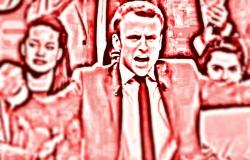Macron’s Tireless Shuttle Diplomacy might hold the Key to Averting a Russian Invasion of Ukraine

Nicholas Ross Smith, from the University of Canterbury’s National Centre for Research on Europe, argues that out of all the Western leaders involved in the worsening situation in Ukraine, only Emmanuel Macron seems to grasp the underpinning geopolitical reality and his tireless efforts to broker a bargain should be applauded.
While it might be too soon to laud the French President, Emmanuel Macron, for helping broker the de-escalation of the Ukraine crisis, his “shuttle diplomacy” efforts over the past two weeks deserve significant praise.
Macron, who is rapidly nearing the end of his first term, is proving the be the most internationally consequential French President since Charles de Gaulle. Whether it’s the Indo-Pacific, African security, Mediterranean security, EU security and defence, EU enlargement, EU monetary reform, and now, the Ukraine crisis, Macron has not been shy in asserting a uniquely French take on these events. Yet, unlike de Gaulle, Macron is a committed Europeanist and is one of the last great advocates for European integration (we will have to wait and see about Olaf Scholz).
Macron is, unashamedly, a man with many visions of the future. Yes, because of this, many find him narcissistic. And, indeed, Macron does seem to like to dominate debates on all topics. For instance, when asserting his ideas for EU reform post-Brexit, Macron wrote an open letter, published in 28 languages and run by some of the leading newspapers in Europe, to the “citizens of Europe” clearly outlining his vision.
It is clear he wants to be front and centre and wants to be an agent of change. He has even been accused of having something of a Messiah complex.
But in an era where politicians are increasingly devoid of ideas and seem to merely fulfil the role of public figureheads, it is refreshing to have someone like Macron who – often at significant domestic political cost – is not afraid to put his ideas out there. Although one might find his ideas ridiculous, lofty, or whimsical, one cannot criticize him for not caring about the big issues that are afflicting Europe and the wider world.
The irony is that while it is the UK that is trying to re-establish itself as an international actor through its “Global Britain” strategy, Macron is quietly having more success in establishing a kind of Global France.
This can be seen in the context of the re-escalation of the Ukraine crisis in 2022, as Macron’s boldness is proving (hopefully) useful in the West’s attempts to stop what seems like an impending invasion of Ukraine by Russia.
Whereas the numerous meetings between the US and Russia have apparently done nothing to alleviate the impasse between the two over Ukraine, Macron is seemingly having more success.
On February 7, Macron travelled to Moscow where he had a six-hour meeting with Putin about Ukraine and the broader European security issue. While the initial optimism of that meeting did not produce anything tangible, Macron has again taken up the cause over the weekend, managing to get an agreement from both Washington and the Kremlin for a diplomatic summit to be held in the next few days – at a time when it appears an invasion might be imminent.
One big reason for Macron’s apparent success in engaging Russia is that he and Putin are on the same page regarding one key stumbling block of the ongoing Ukraine crisis: both agree that Europe needs a new security architecture.
Macron, like de Gaulle (albeit not as outspokenly), has a somewhat suspicious view of the United States and its distorting presence on the European continent. And since Macron took office in 2017, he has continually advocated for the EU to try and take care of its own security. After all, he dd famously chided NATO for suffering from “brain death”.
Most recently, as France took over as the rotating president of the Council of the EU in January (for 6 months), Macron reiterated that "Europe needs to finally build its own collective security framework on our continent" and that “security on our continent requires strategic rearmament”.
Importantly, Macron has also long believed that any new European security architecture needs to better accommodate Russia’s power position (than the previous one). Indeed, Macron has been lobbying for the EU to consider a pathway towards rapprochement with Russia, stating in 2019 that “we need to reopen a strategic dialogue [with Russia]” and “we need to reappropriate our neighbourhood policy, we cannot let it be managed by third parties [the United States] who do not share the same interests.”
While Macron’s aims of engaging with Russia have tended to elicit much criticism and a charge of naiveté, it has likely engendered a belief in the Kremlin that, at the very least, Macron is an independent voice and not someone who is simply the lapdog of the Americans.
Whether Macron can broker a grand bargain with Russia remains to be seen. On the one hand, Russia still holds all the cards by virtue of the fact they are prepared to pay an almighty high cost to pursue their national interests in Ukraine. On the other hand, the United States and Ukraine have, so far, refused to entertain any idea of making concessions to the Kremlin.
Macron will struggle to find a workable middle-ground. But, at this stage of the crisis, merely getting the Americans and Russians back to the negotiating table should be seen as something of a success.
In the long-term, Ukraine would do well in heeding France’s advice, particularly as whatever the United States says, NATO membership is not feasible and its warnings of “grave consequences” should be taken with a grain of salt.
Macron has shown an adept geopolitical read of the situation so far – something which cannot be said of the United States, the United Kingdom, or the European Union – and seems to be the one Western leader who fully grasps the new European security challenges inherent to the post-American world.
If Macron can rally support from other European partners, especially Germany, it is plausible that he might help engineer a new “Ostpolitik” that can help stabilize the European continent. Although such an outcome would generate significant cries of appeasement, it would be a necessary pragmatic bargain built on an understanding that half-hearted support to Ukraine is not a long-term solution and that doing a deal with the devil (Russia) is the only way some stability can be found. Of course, for Ukraine this would mean accepting some kind of managed neutrality (a bitter pill to swallow), but such an outcome is surely preferable to a Russian invasion.
Nicholas Ross Smith is an adjunct fellow at the University of Canterbury’s National Centre for Research on Europe.
Image: Pietro Piupparco via Flickr (CC BY-SA 2.0)


